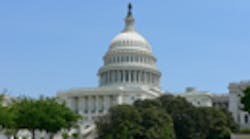An 11th hour Congressional attempt to scuttle the Dept. of Transportation’s (DOT’s) long-awaited effort to overhaul hours-of-service (HOS) regulations for the second time in less than a decade is but the latest example of the increasing legislative pushback being directed against the department’s reform effort.
U.S. Sen. Kelly Ayotte (R-NH) introduced an amendment to the fiscal year 2012 Transportation Appropriations bill that would specifically block implementing changes to any current HOS rules, especially the preference by DOT to reduce a truck driver’s maximum daily driving time from 11 hours to 10 hours and cutting the on-duty “work day” from 14 hours to 13 hours.
Other changes proposed by DOT would impose new restrictions on the“34-hour restart” provision, as well.
“Trucking businesses across the country, including those in New Hampshire, have expressed serious concerns about the negative impact the proposed changes could have on the trucking industry, particularly on small business truckers,” noted Sen. Ayotte, a member of the Senate Commerce Committee, in a press release.
She added that a cost-benefit analysis conducted by the DOT’s Federal Motor Carrier Safety Administration (FMCSA) indicated those proposed HOS changes could lead to trucking productivity losses in the range of $2 billion annually – an issue she raised in a letter to Transportation Secretary Ray LaHood back in June.
“My amendment would prevent the administration from implementing these rules which, by DOT’s own admission, are cost-prohibitive and whose impact on safety is unclear,” she added.
LaHood wrote a letter to Ayotte this week asking her, “in the interest of highway safety” to withdraw her proposed amendment.
“This amendment would prevent the FMCSA from applying the most comprehensive and up-to-date data and analysis to the issue of driver fatigue and allowable hours of service,” he wrote.
“The final rule, if put in jeopardy, potentially undermines the entire regulatory process. In fact, some sectors of the trucking industry could be granted new operational flexibility under the proposed rule when finalized,” LaHood said. “Any disruption in this regulatory process would sacrifice these benefits and create confusion and uncertainty among state and federal enforcement officials, as well as within the motor carrier industry.”
Yet several members of Congress have expressed strong doubt in recent weeks that the proposed changes to HOS will do anything except impose significant extra costs upon the trucking.
“We have not seen any evidence that the current hours-of-service rules, in place now for more than seven years, are unsafe and need revision,” noted Rep. John Mica (R-FL), chairman of the Committee on Transportation and Infrastructure, in a letter, co-signed by Bill Shuster (R-PA), John Duncan (R-TN), and Sam Graves (R-MO), sent to LaHood on Sept. 27.
“In fact, quite the opposite is true. Since implementation of the current rules, there’s been a reduction in severe and fatal crashes involving larger trucks even as truck mileage has increased by almost 10 billion miles,” they said. “Most recently there has been a dramatic reduction in severe and fatal crashes involving large trucks and buses, with a combined 1,497 fewer lives lost between 2007 and 2009. The current rules are clearly having a positive effect on highway safety.”
Robert Sculley, president of the New Hampshire Motor Transport Association, added that not only would truckers suffer from changes to HOS rules, but so would consumers, as the trucking industry would have to raise costs to compensate for lost productivity due to less available work time.
“While there is never a good time to unnecessarily increase costs, this could not be a worse time as our country and state struggle to recover from the ongoing economic recession,” he said.




